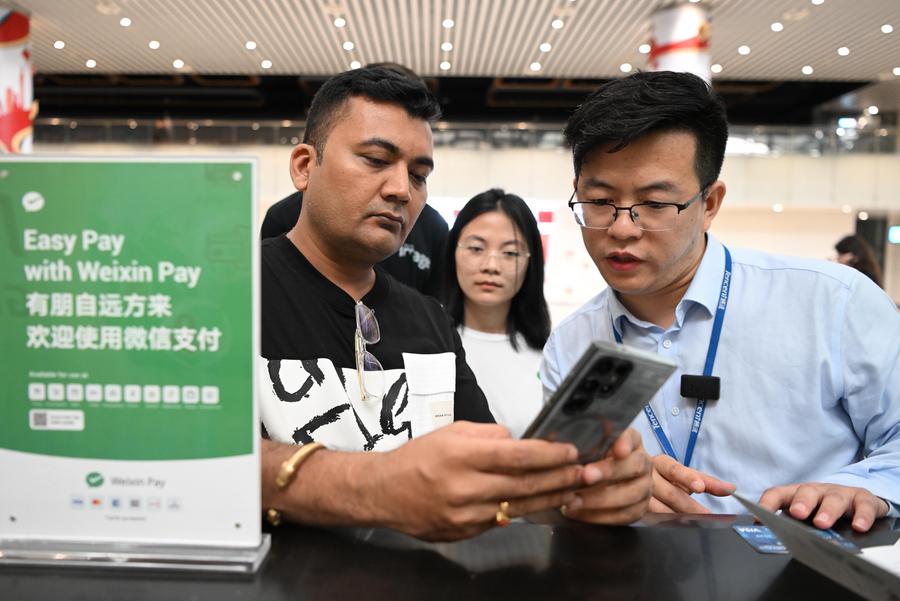China paves the way for more sustainable future through reform and opening up

An aerial drone photo taken on June 27, 2024 shows the Shenzhen-Zhongshan Link in south China's Guangdong Province. (Xinhua/Mao Siqian)
BEIJING, Aug. 8 (Xinhua) -- From the lively food stalls in Taizhou city in east China's Jiangsu Province, where throngs of tourists gather, to the bustling Qianmen Street in Beijing where people queue up for tea-flavored ice cream in the hot summer, nighttime tourism is booming across China.
With a market scale valued at over 50 trillion yuan (about 7 trillion U.S. dollars), the nighttime economy aligns with the nation's efforts to boost consumer spending on services. In the first half of 2024 (H1), surveyed online travel and catering services consumption grew 59.9 percent and 21.7 percent year on year, respectively.
Last week, the State Council announced 20 specific measures to boost service consumption by tapping into consumer spending potential in sectors such as culture and entertainment, sports, tourism, education and training, health, and green products. The latest measures have been put in place on the heels of a highest-level policy meeting of the Communist Party of China (CPC) in mid-July.
The third plenary session of the 20th CPC Central Committee adopted wide-ranging reform tasks to be completed in the next five years, aiming to promote high-quality economic growth that will become more balanced, innovation-driven, integrated, and open.
REFORMS AIMED AT HIGH-QUALITY GROWTH
The plenum's resolution said the country would pursue high-quality development, which was deemed the "primary task" in building China into a modern socialist country in all respects. A to-do list in this regard encompasses work such as fostering new quality productive forces and enhancing the resilience and security of industrial and supply chains.

Visitors are seen at the exhibition area of Chinese NEV manufacturer BYD during the 2024 Beijing International Automotive Exhibition in Beijing, capital of China, May 4, 2024. (Xinhua/Yin Dongxun)
Representing the new growth drivers, China's new energy vehicles reported year-on-year growth of more than 30 percent in both production and sales in H1, industrial robot production rose 9.6 percent, and green energy accounted for 85 percent of all newly installed power generation capacity during the period.
"The machinery industry has accelerated independent research and development of critical technologies and equipment to improve the resilience and security of the industrial and supply chains," said Luo Junjie, executive vice president of the China Machinery Industry Federation.
Zheng Shanjie, head of the National Development and Reform Commission, said efforts would be made on three fronts to develop new quality productive forces, including upgrading traditional industries to make them smarter and more vigorous; expanding emerging industries such as electric cars and cultivating gazelle companies and unicorn companies; and devoting growing investment to future industries.
Zheng said China also seeks coordinated development among different regions to promote the flow and efficient aggregation of various factors and build complementary advantages, as well as integrated urban-rural development to promote the equalization of public services.
In Danzhou city in southern China's Hainan Province, a local dealer of home appliance maker Haier said a trade-in campaign with subsidies and discounts for consumers has pushed up sales. Last month, the Chinese government announced approximately 300 billion yuan in ultra-long special treasury bonds. The funds raised will support consumer product trade-ins and equipment renewals.
Vice Premier Zhang Guoqing, in a written article in a recently published study book on the plenum's resolution, said the country would take comprehensive measures to boost continuous consumption growth by raising people's income, promoting employment and increasing the supply of high-quality products.
"Through the double driving forces unleashed by policy support and reforms, China's economic growth will only be stronger, more balanced and more sustainable," said Han Wenxiu, executive deputy director of the Office of the Central Committee for Financial and Economic Affairs.
A HIGHER-STANDARD OPEN ECONOMY
With a strong interest in the unfolding reforms, China's foreign partners are keen to get first-hand knowledge of the plenum's outcomes. Following the plenum's conclusion, a delegation of the U.S.-China Business Council traveled to China to promote commercial exchanges. Days later, a Chinese business delegation paid a reciprocal visit.
"By cutting down restrictions on market access for foreign investors and doing more to optimize business environment, China encourages companies from all over the world, including U.S. companies, to continue to delve into the Chinese market and share development opportunities," said Commerce Minister Wang Wentao during talks with the U.S. business delegation.

An Indian passenger (L) asks about WeChat Pay, one of China's major mobile payment platforms, at Terminal 2 of Guangzhou Baiyun International Airport in Guangzhou, south China's Guangdong Province, April 3, 2024. (Xinhua/Deng Hua)
The optimization of payment methods also highlights China's meticulous efforts to further open up. More than five million foreigners used mobile payment services in the first half of 2024 after arriving in China, growing fourfold year on year. By refining work procedures, such as facilitating the bonding of foreign bank cards with local payment services and easing restrictions on transaction value, foreigners can enjoy an improved payment experience, according to a central bank official.
"Reform and opening up complement and promote each other ... Only an open China can become a modern China," Wang said in an interview with Xinhua, adding that China believes openness, inclusiveness, and win-win cooperation are the right way in international cooperation.
Wang listed specific work tasks going forward, such as alignment with high-standard international economic and trade rules, unilaterally opening wider to the world's least developed countries, actively participating in the reform of global economic governance, taking steps to boost intermediate goods and green trade, and shortening the negative list for foreign investment, among others.
Noting China's irreplaceable role in addressing global challenges, Italian Prime Minister Giorgia Meloni said during her recent visit to China that the European nation hopes to strengthen bilateral cooperation in such fields as trade, investment, electric vehicles, artificial intelligence, and people-to-people exchanges. President of the Democratic Republic of Timor-Leste Jose Ramos-Horta, during his China visit, witnessed the signing of the Belt and Road cooperation plan and multiple bilateral cooperation documents.
Tang Fangyu, deputy head of the CPC Central Committee Policy Research Office, told the press last month that China will ensure the implementation of reforms with relentless perseverance. "We all know that implementation is important for all work ... Every step forward will not be easy. Only by working harder on implementation can we overcome all kinds of resistance, break the barriers of vested interests, benefit the vast majority of the people, and continuously achieve reform success."
Photos
Related Stories
- High-level opening-up to benefit other nations
- New immigration policies introduced to serve high-level opening up in 2023
- China expands high-level opening-up trials for cross-border trade, investment
- High-level opening-up in spotlight at int'l conference
- China to promote innovation, opening-up, offer more opportunities to world: Chinese vice president
- Hainan works to promote high-level opening-up
- Door shut to those who have shut their door
Copyright © 2024 People's Daily Online. All Rights Reserved.









